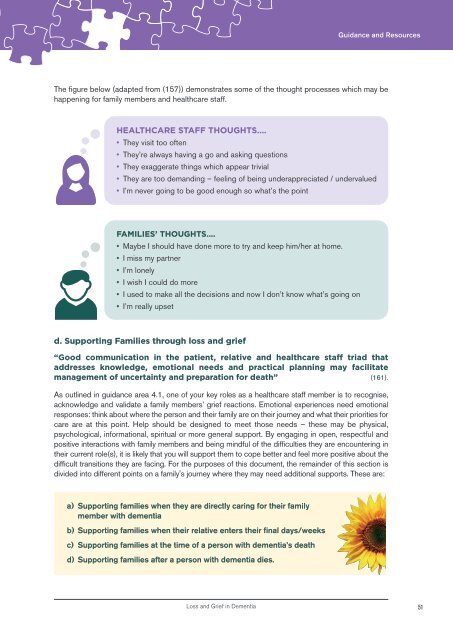Loss and Grief in Dementia
Final-Guidance-Document-3-Loss-Grief
Final-Guidance-Document-3-Loss-Grief
Create successful ePaper yourself
Turn your PDF publications into a flip-book with our unique Google optimized e-Paper software.
Guidance <strong>and</strong> Resources<br />
The figure below (adapted from (157)) demonstrates some of the thought processes which may be<br />
happen<strong>in</strong>g for family members <strong>and</strong> healthcare staff.<br />
HeALtHCARe StAff tHOuGHtS….<br />
• They visit too often<br />
• They’re always hav<strong>in</strong>g a go <strong>and</strong> ask<strong>in</strong>g questions<br />
• They exaggerate th<strong>in</strong>gs which appear trivial<br />
• They are too dem<strong>and</strong><strong>in</strong>g – feel<strong>in</strong>g of be<strong>in</strong>g underappreciated / undervalued<br />
• I’m never go<strong>in</strong>g to be good enough so what’s the po<strong>in</strong>t<br />
fAmILIeS’ tHOuGHtS….<br />
• Maybe I should have done more to try <strong>and</strong> keep him/her at home.<br />
• I miss my partner<br />
• I’m lonely<br />
• I wish I could do more<br />
• I used to make all the decisions <strong>and</strong> now I don’t know what’s go<strong>in</strong>g on<br />
• I’m really upset<br />
d. Support<strong>in</strong>g families through loss <strong>and</strong> grief<br />
“Good communication <strong>in</strong> the patient, relative <strong>and</strong> healthcare staff triad that<br />
addresses knowledge, emotional needs <strong>and</strong> practical plann<strong>in</strong>g may facilitate<br />
management of uncerta<strong>in</strong>ty <strong>and</strong> preparation for death” (161).<br />
As outl<strong>in</strong>ed <strong>in</strong> guidance area 4.1, one of your key roles as a healthcare staff member is to recognise,<br />
acknowledge <strong>and</strong> validate a family members’ grief reactions. Emotional experiences need emotional<br />
responses: th<strong>in</strong>k about where the person <strong>and</strong> their family are on their journey <strong>and</strong> what their priorities for<br />
care are at this po<strong>in</strong>t. Help should be designed to meet those needs – these may be physical,<br />
psychological, <strong>in</strong>formational, spiritual or more general support. By engag<strong>in</strong>g <strong>in</strong> open, respectful <strong>and</strong><br />
positive <strong>in</strong>teractions with family members <strong>and</strong> be<strong>in</strong>g m<strong>in</strong>dful of the difficulties they are encounter<strong>in</strong>g <strong>in</strong><br />
their current role(s), it is likely that you will support them to cope better <strong>and</strong> feel more positive about the<br />
difficult transitions they are fac<strong>in</strong>g. For the purposes of this document, the rema<strong>in</strong>der of this section is<br />
divided <strong>in</strong>to different po<strong>in</strong>ts on a family's journey where they may need additional supports. These are:<br />
a) Support<strong>in</strong>g families when they are directly car<strong>in</strong>g for their family<br />
member with dementia<br />
b) Support<strong>in</strong>g families when their relative enters their f<strong>in</strong>al days/weeks<br />
c) Support<strong>in</strong>g families at the time of a person with dementia’s death<br />
d) Support<strong>in</strong>g families after a person with dementia dies.<br />
<strong>Loss</strong> <strong>and</strong> <strong>Grief</strong> <strong>in</strong> <strong>Dementia</strong><br />
51


